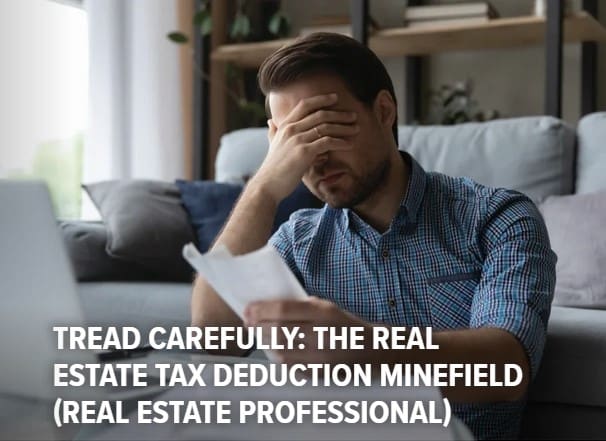
As you may know, real estate taxation is mostly governed around court cases and a mish mash of revenue rulings, regulations, and other common/best practices.
However, one area of tax law is actually statutory (an actual law passed by Congress).
Among these tax laws, the “Real Estate Professional” (REP) exception under IRC 469(c)(7) stands as an essential tool. But for those located in the Golden State, another layer of complexity is introduced due to California’s distinctive nonconformity to certain federal tax laws.
REP: NOT JUST ANOTHER TAX PERK
The REP exception, under IRC 469(c)(7), isn’t a casual nod from the taxman. It’s an engraved invitation to the elite club of federal tax deductions. With it, savvy real estate professionals can pivot their rental actions from “just another passive activity,” which would be subject to passive activity loss rules, to “look at me, I’m active!” With the right maneuvers, this could mean offsetting losses against a plethora of income types. But here’s the catch: that coveted invite isn’t for everyone. Proving you’re on the list requires more than just a declaration.
THE TWO KEY TESTS TO BE REP CERTIFIED
1) Personal Services Test: Over half your annual professional services must be deeply rooted in hands-on real property businesses.
2) Hours Test: A commitment of 750+ hours a year to these property centric businesses (that’s an average of 15 hours per week).
But here’s where many trip: It’s not just about showing up. The IRS wants to see you in action, immersed in the daily grind. Casual coffee shop chats about property values? Those won’t cut it. And if you’re banking on your day job in property management or real estate to see you through? Think again. Unless you’ve got a 5% ownership stake in that business, those hours won’t count. And trust me, I’ve seen many face this heart wrenching revelation.
Also keep in mind the modified – the two tests above must be passed together. So, if you’re working a full-time job (presumably at 2,080 hours a year) and you also work over 750 hours in real estate on the side, you will not pass this test, since over 50% of the hours spent must be in real estate trades.
THE IRS AUDIT NIGHTMARE
Claiming to be a REP and falling short on the hours can be more than just a tiny misstep; it can be a colossal blunder. If the IRS decides to peek into your claims and you’re found lacking, be ready for headaches, heartaches, and potential financial pain. Those claimed deductions can be disallowed, and the taxman will slap you with penalties and interest on underpayment for doing so.
If your case is questionable, I’d recommend documenting your hours in a timesheet day by day to substantiate and prove the ratio of hours spent in real estate versus not.
If you’re already a full-time real estate broker, construction professional, or property manager, you most likely have little to worry about, but it’s still worth going through the exercise to make sure.
CALIFORNIA’S OWN SET OF RULES
If you’re in California, then it gets a little messy. In contrast to federal law, California does not conform to the REP exception. Even if you qualify as a REP on the federal level, California still categorizes your rental activities as passive. This divergence means you cannot offset non-passive income with passive losses at the state level, which is a huge departure from federal tax treatment.
What’s interesting about the non-conformity situation is that a typical CA-based taxpayer with substantial real estate activities can have a federal taxable income of $0 and as a result, income tax outcome of $0 while also tons of losses to carry over to future years as a result of cost segregation studies.
Simultaneously, for California income tax purposes, they can owe a substantial California taxable income number with a reasonably sized tax bill (up to 13.3% in CA) to pay at tax time.
CLOSING SHOTS:
Navigating REP is akin to walking a tightrope. On one side, there’s the treasure trove of deductions. On the other? Potential pitfalls, especially if the IRS comes knocking. And for Californians, there’s an added layer of complexity. Bottom line: Overclaiming your REP status isn’t just risky— it can be downright costly. When playing the REP game, always lead with precision and caution. After all, no one wants an unexpected date with the IRS.
Position Realty: (480) 213-5251



